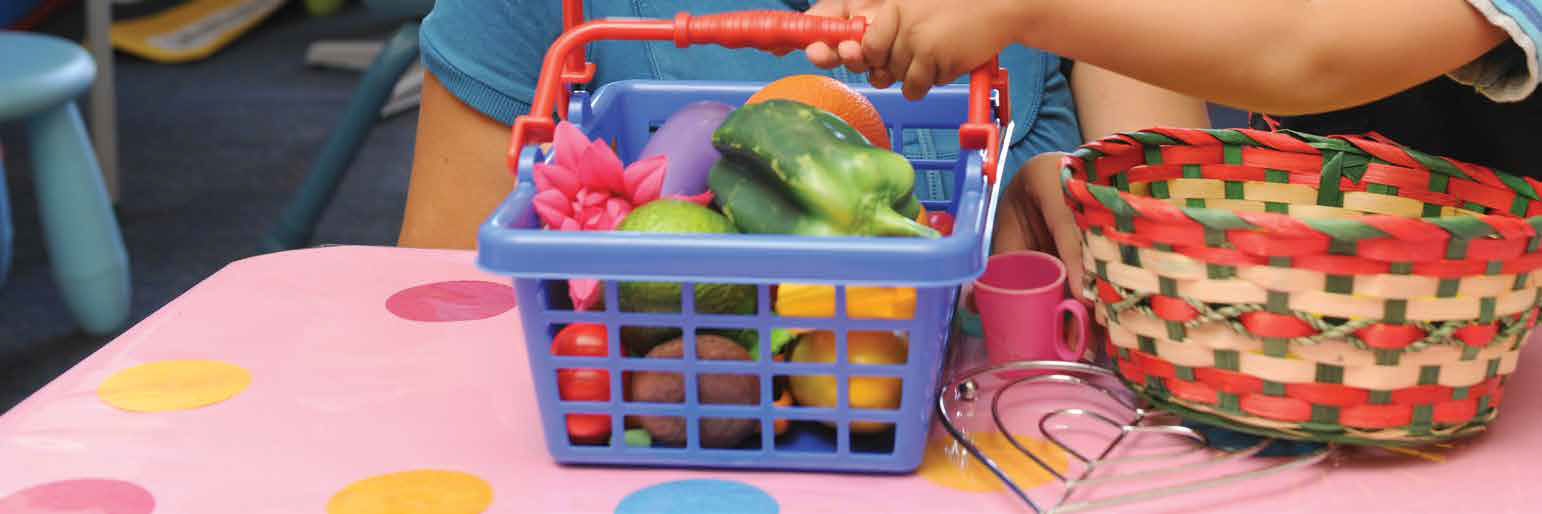Dramatic play – shopping fun
Reading together
Reading can happen anywhere and it’s useful in everyday life to read shopping catalogues, read and write shopping lists and to find the products that we want in the store.

Activity
Make a shop at playgroup using pretend fruit and vegetables, empty food boxes and containers such as yoghurt or ice-cream containers. Add a cash register, pretend money, food catalogues, bags, baskets, shopping list pads and pencils.
Encourage parents/carers and children to read catalogues, write shopping lists and make signs together.
What you'll need
- Pretend fruit and vegetables
- Empty food boxes and containers
- Notepad for shopping lists
- Pencils or textas
- Pretend money
- Baskets
- Bags
- Shopping catalogues
- Cash register
- Shelf or table
- Cardboard for signs
- Blu tac
- Stickers for prices
- Old receipts
- Scales
Words to use
- Shopping, basket, bag, pack
- Customer, salesperson, checkout operator, supervisor, manager, baker, fishmonger, butcher, greengrocer
- Receipt, catalogue, list
- Dollars, cents, prices and change
- Weight, gram, kilograms, litres, millilitres
- Frozen, dairy, meat, poultry, seafood, fruit, vegetables and merchandise
- Apples, banana, carrots, potato, rockmelon, watermelon, starfruit, dragonfruit, pumpkin, strawberry, zucchini, lettuce, cabbage, leek, eggplant etc
Questions to discuss
- Can you help me find some apples and bananas?
- How much will that be?
Learning through play
Ways to develop numeracy through play
- Use money and a cash register.
- Write prices on stickers or signs.
- Write the phone number and opening hours (time) on a sign.
- Count how many of each item.
- Sort and group similar items and types of food.
- Look at prices in a shopping catalogue.
- Talk about quantities and weights.
- Talk about large and small sizes of products.
Ways to develop literacy through play
- Write a shopping list or cut out pictures from catalogues of food that you would like to buy.
- Make signs for your shop.
- Write a receipt.
- Make a specials board.
- Talk about the food and products sold in the shop and where they might have come from. For example, ‘the farmer delivered a cart full of apples this morning from his orchard’.
- Talk about food from different cultures.
- Use words such as catalogue, prices, checkout, aisle, cash register and money.
- Dress up and act out various roles – mum, dad, sister, baby or friend.
- Shop assistant.
- Play a shopping memory game – The first child says, “I went to the shops and I bought an apple.” The next child says, “I went to the shops and I bought an apple and a banana.” Each child adds one item and tries to remember the other items bought in the correct order. Simplify for younger children by using props such as plastic fruit or vegetables as visual reminders and only do a few items.
Extensions and variations to this activity
- Vary the type of shop – consider a bakery, ice-cream parlour, greengrocer, bank or florist.
- Use recyclable material to make some food for your shop, eg make pretend cakes or fish to sell.
- Do some pretend cooking and go to the shops to buy the ingredients that you need.
- Move the shop outside.
- Add some real fruit, vegetables or herbs. After the activity, involve children in the preparation and sharing of what they ‘bought’ at the shops.
- Visit a local shop or market.
- Other dramatic play ideas include:
- post office
- restaurant
- pet shop
- hospital/doctor’s surgery
- hairdresser.
Supporting parent engagement in play
Play prompts:
Use words such as fresh, frozen, tinned or dried, dairy, smallgoods, bakery or freezer section, checkout, catalogue, fruit and vegetables, dollars and cents. Ask questions, like:
- What do we need at the shops today?
- How much does that cost?
- Where can I find the...?
- Do you have any...?
Parents or carers can:
- Comment on what their children are doing (say what they see).
- Talk in their home language.
- Use literacy and numeracy words (see words to use section above).
- Help their child to write a shopping list.
- Look through catalogues to find items that the children want on their list.
- Help with cutting and gluing items from the catalogues onto a shopping list.
- Role play in the shop, taking on different roles such as the customer or salesperson.
You can help families by:
- Modelling what you want them to do.
- Talking to them about the focus of the activity and what children might be learning.
- Writing up words that go with the activity.
- Making suggestions on what families can do at home.
Related Great Start activities
Great Start activities are for parents and carers to do with their children.


